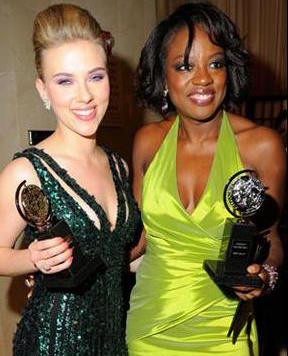 Scarlett & Viola won the supporting & lead actress Tonys in 2010. Now Viola is headed for a supporting trophy (for the same role) by Lynn Lee
Scarlett & Viola won the supporting & lead actress Tonys in 2010. Now Viola is headed for a supporting trophy (for the same role) by Lynn Lee
If it’s Oscar season, there must be category fraud lurking somewhere. This year most of the debate has centered around Viola Davis, whose barn-burner of a performance opposite Denzel Washington in Fences is a virtual lock ...for supporting actress gold. There’s little doubt the decision to go supporting was driven by the perception that lead actress would be a much tougher road in an especially competitive year. Still, it’s such a powerhouse turn that many Viola fans are justifiably frustrated by what looks like a cynical lack of faith in both her and the Academy.
And yet, having previously read the play and seen it performed on stage – though not the production that starred Viola and Denzel – I can’t help wondering if this is as open-and-shut a case of category fraud as it appears. In terms of the weight and magnetism of Viola’s performance, it feels like a lead role. But the way the role is written, as August Wilson conceived it, I think is a closer call...
[spoilers ahead]

For the first two-thirds of Fences, Viola’s Rose is a quiet, steadying presence, alternately laughing at, chiding, and submitting to the attentions of her larger-than-life husband, Troy (Denzel). It’s not just her, either. Troy’s the kind of guy who likes to talk and hear himself talk, and neither Rose, nor their son Cory (Jovan Adepo), nor Troy’s friend and co-worker Bono (Stephen Henderson), can get much of a word in edgewise once he gets going. And for the most part, they don’t try particularly hard. But the dynamic shifts radically when Troy finds himself in a moral bind and in the uncomfortable and uncharacteristic position of supplicant. He throws himself onto Rose’s mercy, knowing he’s in the wrong, but being Troy, he can’t help casting himself as the victim of a greater wrong—if he cheated on her, it was because society cheated him. Weighed down by his responsibilities and his lack of advancement, he cheated because it helped him forget temporarily that he’s “been standing in the same place for eighteen years.” That’s when Rose explodes:
I been standing with you! I been right here with you, Troy … I gave eighteen years of my life to stand in the same spot with you.
Don’t you think I ever wanted other things? Don’t you think I had dreams and hopes?
Despite her own doubts and disappointments, she stayed with him, she kept her faith in and with him, she gave everything of herself to him, while he took it all for granted. It’s a riveting come-to-Jesus moment in the play. In the movie, as delivered by Viola, it’s volcanic; if she doesn’t literally breathe fire, she all but does emotionally. She also does what seemed impossible: she completely eclipses Denzel. Even though his Troy, momentarily stunned into silence, lashes back (catching young Cory in the cross-fire), it’s too late for him to reclaim the spotlight entirely. He now shares it with Rose.
Ultimately, though, Rose allows Troy’s choices to continue to dictate hers, partly because she’s a better person than he is, partly because her choices are realistically even more limited than his. She stays with him and raises his daughter as her own, even as she watches him drive away their son. And even after Troy passes on, she compels the estranged son to honor him. Her final monologue serves as an elegy for Troy, but also for the life she might have lived:
When your daddy walked through the house he was so big he filled it up. That was my first mistake. Not to make him leave some room for me. For my part in the matter. But at that time I wanted that...
I didn’t know to keep up his strength I had to give up little pieces of mine. I did that. I took on his life as mine and mixed up the pieces so that you couldn’t hardly tell which was which anymore. It was my choice. It was my life and I didn’t have to live it like that. But that’s what life offered me in the way of being a woman and I took it.
This speech doesn’t conclusively establish that Rose is “only” a supporting character. If anything, it simply underscores how much Troy depended on Rose for his own identity and self-worth, and how being an African American woman in the 1950s added an extra handicap that Troy never had to deal with. There’s a fair argument to be made that Rose is the unsung hero of his story. But it’s hard to deny that it is still his story, with all of the other characters’ arcs defined by Troy’s effect on them.

Notably, when the play premiered on Broadway in 1987 (with James Earl Jones as Troy, Mary Alice as Rose, and Courtney B. Vance as Cory), Mary Alice was awarded the Tony for best featured actress. For the 2010 Broadway revival, however, Viola won the Tony for best (lead) actress. Little change was made to the play’s text in the revival. The only thing that changed was the actress. If Viola seems like a lead, it’s a tribute to the singular power of her performance. And perhaps that’s all we need for Oscar to recognize her as such; it would certainly be deserved. But in a way, a nomination for best supporting actress would be oddly fitting, thematically, for a character who played supporting when she should have been the lead.